 These people aren’t the 10 richest, the 10 most influential, the up-and-comers, the movers and shakers, the whatever-happened-tos or any other of the labels that are pretty much used up on the newsstands by now.Most of them made some news, big or small, in 2017. We talked with them for a while and found much more to enjoy and learn from. The interviews were edited for length and clarity. The photos are, for the third year, by Khalid Ibrahim.
These people aren’t the 10 richest, the 10 most influential, the up-and-comers, the movers and shakers, the whatever-happened-tos or any other of the labels that are pretty much used up on the newsstands by now.Most of them made some news, big or small, in 2017. We talked with them for a while and found much more to enjoy and learn from. The interviews were edited for length and clarity. The photos are, for the third year, by Khalid Ibrahim. ETIENNE CHARLES
ETIENNE CHARLES MUSICIAN AND TEACHER
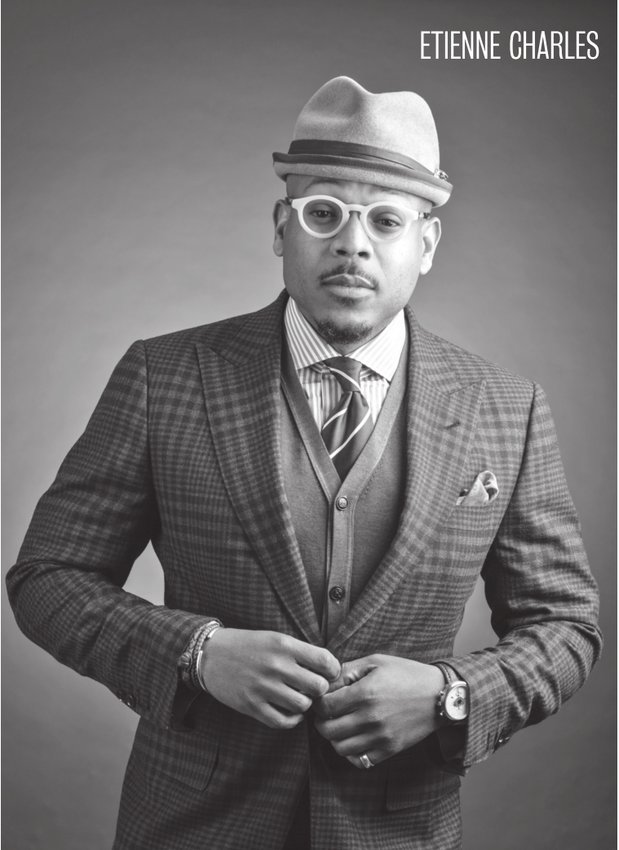
Trinidad-born composer-trumpeter Etienne Charles, 34, is a teacher-scholar, one of the world’s greatest jazz trumpeters, an ethnomusicologist and much more. A 2015 Guggenheim Fellow in Creative Arts, Charles joined MSU’s jazz studies faculty in 2009. He has recorded seven albums that delve with nimble clarity into the knotted roots of American, African and Caribbean music.
Last January, Charles went to Queen’s Hall, Trinidad, to premiere his newest project, “Carnival,” which will be released in the U.S. in June 2018.
—LAWRENCE COSENTINO
How do you deal with the tension between music as a diversion from what is happening and music as an immersion in what is happening?
I do both. Music is for making people feel good. The activism is something you can throw in because you have people in a state of feeling good. We play “Speed City” from my last album, “San Jose Suite,” at just about every gig. While writing the suite, I got to know Dr. Harry Edwards, the mind behind the resistance at San Jose State that led to desegregation on campus. In the early 1960s, black students could only major in bail bonds, social work, physical education. Most of them couldn’t get a lease for an apartment. I talk about that before we play the song. I talk about inequality.
How does that go over?
People thank me for it. A lot of people in this country know that something is wrong. But sometimes people come up to us and they’re like, “That ruined the show for me.” We play Harry Edwards’ voice clip before we play the song. [“Our struggle must be multi-faceted and perpetual, and there are no final victories.”] I remember playing in New York, and a Canadian police officer said that it ruined the show for her because I talked about police brutality. We had an hour-long conversation.
Did you bring her around?
No. She’s a police officer. It actually got really messed up. These are the risks we take. But we played it somewhere else, and a gentleman was there, who was at San Jose State student at that time. He was like, “Man, I don’t believe you brought this up. I remember it like it was yesterday.”
Sometimes it’s easy to confuse yesterday with today.
It’s weird in America, because you’ve got people protesting the same shit they were protesting 50 years ago. You’ve got athletes protesting police brutality. I get pulled over all the time in East Lansing. I could write a song using police lyrics: ‘Where are you coming from? Where are you going? Is this your car?’ Fortunately, the police here aren’t trigger-happy. Harry Edwards is a dear friend and mentor now. Every time something happens, I text him and he rattles off his thoughts: “I was thinking about this 60 years ago.”
Even your newest project, “Carnival,” began with months of research in ethnomusicology but comes around to today’s headlines.
I see it also as a form of peaceful protest.
This album is about, “Y’all take note. It’s about to get even more messed up here.”
What can “Carnival” teach us today?
The reason we have Carnival [in Trinidad] the way it is today is we have a conflict, a clash. The British had problems with aspects of Carnival, the stick fights, and they sent the police to try to suppress it. In 1884, they banned drums. No drums with skins allowed in public.
So they used bamboo, and later iron, and that led to steel bands. That’s the evolution of our resistance against British oppression. That’s what my composition “Black Echo” is about — when you silence something, there’s an echo.
That is a very powerful idea.
You saw it in New York, when they stopped public school music education. The echo of that was hip hop. Most of those rappers, MCs and producers would have been the next generation of jazz musicians, had they had instruments. I’m not saying hip hop would not have happened. But there were a lot of people who didn’t get a chance to learn music in that generation. I’m waiting to see what’s going to happen because they just stopped public school music in Lansing. I’m waiting to see what that echo here in Lansing is going to be.
Is there an endgame to all your research? Are you heading toward a synthesis?
No, no, no, no, no, no, no. There’s so much to learn. The deeper you dig, the deeper you want to dig.
Your international profile grows every year. What keeps you in Michigan?
I’m grateful to be on the best full-time jazz faculty in the world. I’m a tenured professor, and ethnomusicology is close to my heart. MSU is a Research One institution. Some places couldn’t care less what happens in the hills of Trinidad, but they care. I’m close to a lot of good, clean water. This place is special.
SALESMAN AND EDUCATOR
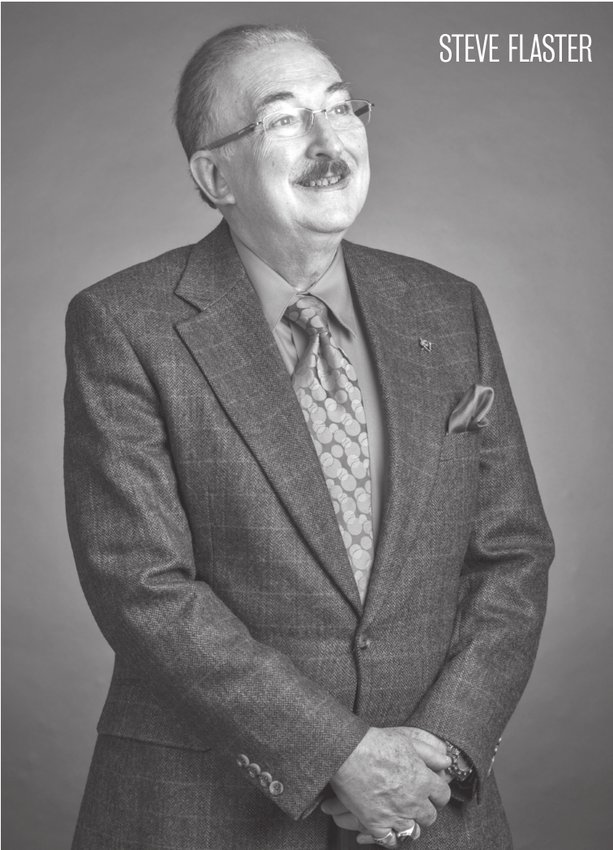
Steve Flaster, 72, still has his accent from the Bronx, where he grew up and where he was “always, always, always, always” interested in apparel, influenced by his grandmother, who owned a small fashion shop in Brooklyn. While in business school, his adviser told him about his college roommate, Stanley Hollander (the late husband of Selma Hollander, another New York transplant and artist who recently turned 100), who taught business at MSU. “’You go there and he will take you under his wing,’” his adviser told him. “So, I did, and he did. I meant to be here four years. And here I am 51 years later talking to you.” Those five decades spanned education, running a local chain called Green’s Apparel, selling women’s clothes at the old Jacobson’s Department Store in East Lansing and, for the last 10 years, teaching at MSU.
— BERL SCHWARTZ
How did you get your start?
In New York, I was an assistant buyer for a resident buying office, where you helped smaller stores who couldn’t be in the New York buying market all the time. And then, before I came out here I was on the executive training squad for Bloomingdale’s.
How did you get involved with Green’s?
I did some consulting for the owner while in school. He says, “I like all your ideas, but I don’t know how to implement them myself. Why don’t you come into the business with me? I’ll make it worth your while.” And he did. So I did. Until the business went bankrupt 30 years later.
Why?
Women were very much into dressing for business, but then it all changed.
Women started wearing pants and jeans to work. Everything became more casual. And when that all changed, all these stores like mine started going downhill. I was foolish and arrogant enough not to think it would happen to me, but it did. And, literally, I lost everything and had to start over again at age 57. Which I did.
What did you do?
Well, I did not lose my self-concept. I went to Jacobson’s. I said, “I wanna sell.” They said, “How can you sell? You were the president of a company, how can you get on a sales floor and sell?” So I said, “I think I’d be very good.” They didn’t wanna hire me. It was just after Thanksgiving. I said, “Why don’t we try it till Jan. 10? Say I’m a temporary worker. If it’s no good, I leave and you never see me again. If it’s good, we make a new deal.” It was good from day one. In a year and a half, I became the No. 1 salesman of women’s apparel in their 11 Midwest stores, selling almost a million dollars a year. I was ready to spend the rest of my career there, and they were delighted about it. And then after 134 years for Jacobson’s and 4 1/2 years of my life, they went bankrupt, too.
You were 62. What did you do then?
I remembered two things. Number one: You’re rewarded in life for doing a good job. I had done such a good job with my customers that I had a very steady following, a few hundred women who said, “Steve, what are we gonna do now? We’re so used to you helping us pick out clothes.” My wife actually thought of the idea. She says, “Why don’t you start a service?” So we started Jacobson’s Alumni Association, which was literally by membership for all my former customers. The manufacturers did trunk shows at our house. And it’s been very good. It’s much smaller now, because a lot of them have gone south in one way or another.
What was the other thing you remembered?
“You’re qualified to teach at the college level. Why don’t you go back and do it?” I had a master’s and most of a doctorate, except for writing my dissertation. I have this position at MSU in the Advertising Department called a professor of practice. I teach senior level courses, so I must be good. OK? I’m also the campaign chairman for the Humanitarian Charity. And I try to write and publish at least one article a year. I stay busy.
What do you hope students learn from you?
How to approach a problem and then create a solution. Because that’s what we are —problem solvers. If a woman needs a dress for a wedding, we’re a problem solver. In business, we’re all problem solvers.
And you really do better for yourself and for people who depend on you if you think of it that way. And that’s what I try to get my students to do. One of them wrote in my evaluation, “Flaster doesn’t just teach you a course, he gives you life lessons.” And it’s true. I’m very, very light in computers, technology, anything like that. But I’m great in experiences.
VOCALIST
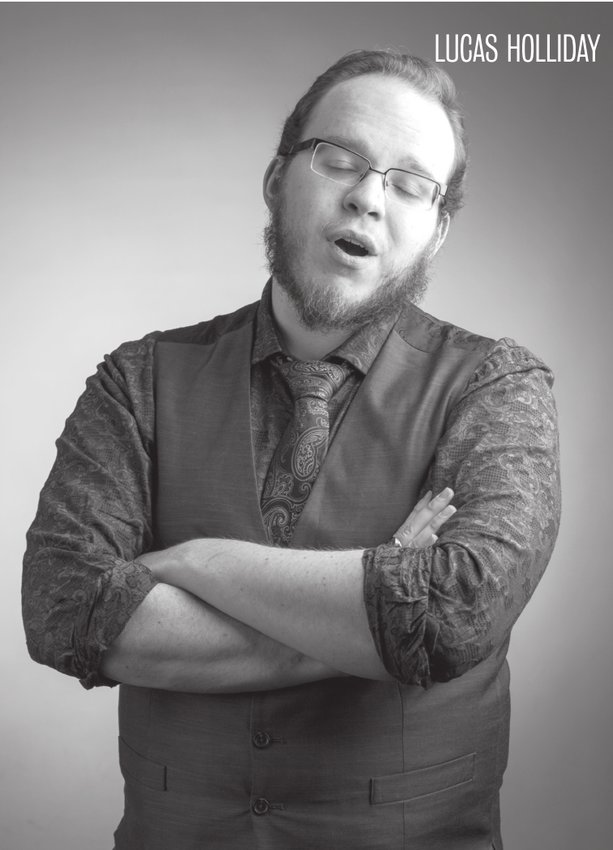
In the span of one year, Lucas Holliday went from an unknown local Dollar General store clerk to singing in front of millions on NBC’s “The Voice.” The catalyst for this burst of fame was a November 2016 viral video of the vocalist belting out a soulful Maxwell cover behind the cash register. From there, Holliday, 27, was featured on “Good Morning America,” and soon after the lifetime Lansing resident was chatting it up backstage with the likes of Jennifer Hudson and Miley Cyrus. He is in the studio recording a solo album with producer “Boogie” Bob Baldori as well as a record with his group, Tell Yo Mama. This interview was conducted before his arrest in Lansing for drug possession.
— RICH TUPICA
Looking back, are you happy with your run on “The Voice”?
I made the Top 24, and that’s great.
That all started when I was emailed by folks at NBC. They hunted me down. It wasn’t my initial intention. They used my viral video as my audition tape.
Can you pin down one surreal moment while you were in Los Angeles shooting the show?
Everything leading up to it was kind of routine, just working as a musician with other people in the professional world. I was excited, but I wasn’t tense. I’d known the song for years. The first song I did was “This Woman’s Work,” by Maxwell, and obviously I was known for singing his song “Ascension” in the viral video. Then I get on stage, the lights come down and the music starts playing. It gets real. You realize this is going to be on television and millions of people will see it.
Who were the celebrity judges in front of you? Were you nervous you wouldn’t get picked?
Sitting there were Adam Levine, Miley Cyrus, Jennifer Hudson and Blake Shelton. I was singing, and finally, right near the end, I thought, “Well, this is it.” At the last second, before my last line, I hear the noise and the light go off and Jennifer Hudson turns around and I see her jaw drop to the floor. I was happy just to experience that moment.
Your viral video has scored millions of eyes, but what initially inspired you to sing at the store, on the clock?
While I was working at Dollar General, there was a point where my manager had left. The store had some issues and was rough managerially. There were many times I almost walked out, but I stuck it out. Since there were people not caring about certain protocols, I thought, “I’m just going to start singing while I’m here.” It wasn’t for attention, it was my therapy and I like sharing music.
Another high point of your year was performing before thousands at a Maxwell concert at the Palace of Auburn Hills. How did that come about?
Maxwell, through “Good Morning America,” sent me this video, a formal invitation. The whole week, I had to work like normal at the store, then the day of the show I arrive in Detroit I was able to take the day off. That was the moment I realized this was not a joke. I had never been to the Palace for a show or a game. My first time there was walking through the back, VIP entrance.
When did you first realize you have such a strong voice?
Around 2005, when I was a freshman at Everett High School, but I had been singing my whole life. I was always singing with my friends recreationally, always outside or on the corner singing. Around that time, I had already been in a bunch of choirs. It was around my freshman year of high school that someone told me, “You need to promote yourself more.”
In high school, what records were you spinning the most?
At the time, I was into R&B groups like Jodeci, Mint Condition and Boys II Men. I was also into Dru Hill, H-Town, all of the classic ‘90s R&B. Guess I was 10 years behind. Want to talk about antiquated? When I was a kid I was listening to ’50s doo-wop, that was through my father. He grew up in that era of the four or five-man vocal groups.
So music was just a part of growing up?
Both of my parents were musically inclined. My dad, who passed away in 2012, was a fan but wasn’t really a singer. My mom is a singer — she was singing in a karaoke joint last week. She used to sing in the church choir. It was church and karaoke that kicked off my inspiration to sing.
Since “The Voice,” you’ve become known as a solo artist. Do you still have time for your local band, Tell Yo Mama?
For sure, that’s my main breadwinner right now. It’s everything I am pushing for musically. We have been recording and hope to release that soon. The band is a seven piece, so it allows us to spread out sonically. These days, we’ve moved toward funk, dance and a little disco. It’s always R&B oriented and a good mix of covers and originals. I am a soul guy, so anything I consider soul, I’m down with.
STUDENT, DESIGNER AND ARTIST
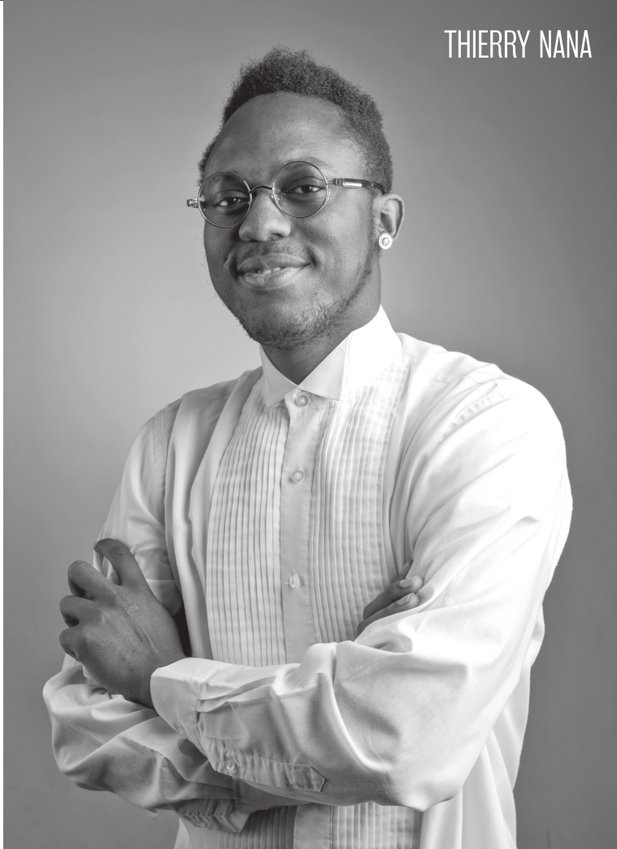
Thierry Nana, 30, left Douala, Cameroon, in West Africa and moved to Lansing three years ago, fleeing a disapproving family and a conservative culture that couldn’t handle his being gay.
With help of friends in Lansing, Nana has moved with impressive speed toward his goal of becoming a world-class fashion designer. He is finishing his sophomore year at Kendall College of Art and Design in Grand Rapids and has mounted several painting and fashion shows. Next year, he plans to move to L.A. to go to FIDM, the Fashion Institute of Design and Merchandising.
— LAWRENCE COSENTINO
How would you describe your approach to fashion?
I’m trying to give a vision where fashion is also art. I’m trying to be a high fashion designer. I don’t want to be boring. I want to say something, open people’s minds.
At school I decided to do design some clothes with a very complicated fabric. My mom said, ‘You’re crazy. How long have you been in school?’ I told her, ‘If you think this is crazy, you’ll be surprised about what’s coming next.’
How did things work out in Grand Rapids?
I struggled and went through depression. The culture was strong and people were mean because I have an accent. My family said, “Pack your stuff and accept that Grand Rapids was a mistake.” People look at you and judge you, the way you look like. For me, being black, I didn’t think it was a problem, but you feel some people are being racist with you because of your skin or your accent. And you have to pay the bills, be responsible. I got a job in a restaurant, and then at Hop Cat.
Is that why you’re leaving the Kendall College of Design to go to L.A.?
People at Kendall are very conservative.
I felt I had to go someplace bigger than Michigan. I couldn’t go from Lansing to L.A. just like that. I had to go step by step and learn American culture and attitudes. I went to Grand Rapids to see how a big city works and not get eaten by people.
Your mom is a fashion designer. Does she approve of your being one too?
She didn’t teach me, not because she couldn’t, but because people back home make her think teaching me fashion would make me more feminine, make me gay.
My mom started to believe in me when I was at home and I started showing her some of my stuff.
I brought some paintings home, and my mom started to look at me differently. I sewed some clothes for a band doing a video and showed her the clothes.
Are your parents OK with your being gay?
They’re not super happy. They’re OK, though. What I went through in Grand Rapids brought me together with my mom. We had a talk. She said, “You have to give me time. I’m trying. If you’re happy, I’m happy.” It’s not like they’re calling to ask, “Do you have a girlfriend?” They know I’m gay. They accept what’s going on.
What is the hardest thing about adjusting to life in America?
My expectation when I came here was too high, from American TV. I felt like I wanted to go back home because it was hard for me. A big thing was relationships. I started dating. I tell myself, “I’m a classy guy. I believe in love.” I wanted to find someone I would learn to know, someone where you would not be afraid he’s going to leave you in two years because he found someone else. Someone that — even if you go out and find someone more beautiful, you still believe you love him and stay with him, not treat it like a change of clothes.
And that has been hard to find?
People just say, “Well, you’re cute.”
That’s why they are interested. “The conversation should be, “I learned something, you learned something.” Sorry to say it, but people talk about some stupid thing, they are just looking for sex. You start talking serious, they say, “I’m too young to think about this.”
What are you looking for in life?
I’m looking for something bigger. I don’t think I was born to be that man who is going to just have a good job, take care of my family and go to work. I believe I have a big purpose. I can’t be Mr. Normal. I tried but it didn’t work for me. If I went to California too soon, I don’t think I’d be alive. People take drugs, do bad things because they can’t handle things. I learned from going to Grand Rapids. I can be ready for L.A. now. I know it won’t be easy, but I know it will be great.
PUBLIC SERVANT
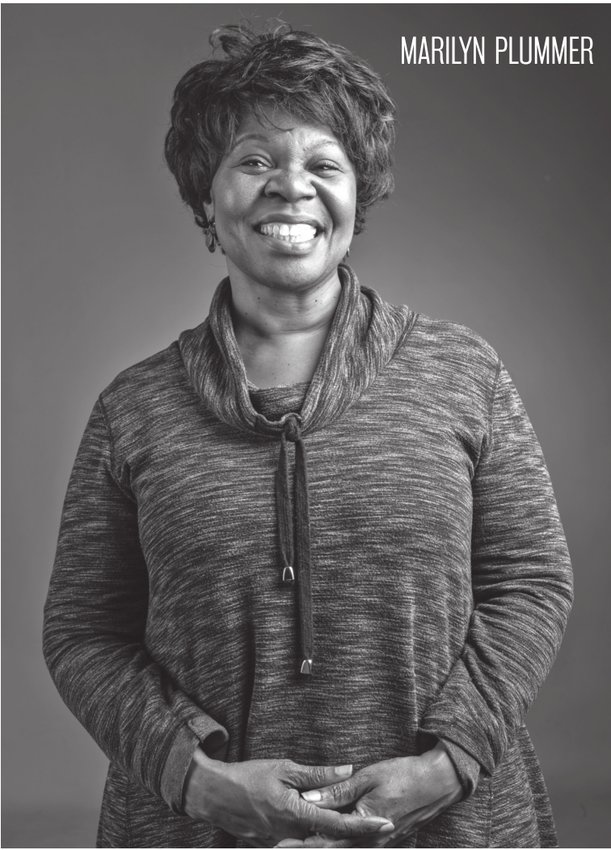
Marilyn Plummer, 63, Lansing Mayor Andy Schor’s community outreach coordinator, has lived her life in the greater Lansing area, witnessing and being party to some of the region’s important gains for African-American equality and history recognition. While a freshman at Sexton High School, she joined upperclassmen in protesting the district’s lack of education on African-American history. The next year her family moved to Mason, where she became the first African-American to graduate from Mason High School. That history, she said, helped her focus on bringing the annual Juneteenth celebration to the city. She’s served as president since 2004.
— TODD HEYWOOD
Tell me about that conversation with mom and dad when they said, “So we’re moving to Mason.”
Oh, well we were quite rebellious. My oldest brother didn’t have to go. He was of age. He was done with school. So it would have been me myself, being the second oldest child and everyone underneath me. No one seemed to react as much as myself and my sister, who would be on her way to Sexton High School if we had remained at Lansing, so we started to make plans of how we were not going. We were just not gonna go. We had lots of relatives in the city. We could easily stay behind and live during the week with an aunt, any one of them. So needless to say, as we inquired more, talked with our relatives, they looked at us like, “I don’t think so.” Whatever your parents say is what you’re gonna need to do. So they declined our idea, and I just kind of put it out of sight, out of mind until it was really time to go.
You showed up at Mason High School in 1970. What was that like?
We had a beautiful house on 10 acres.
We walked this half-mile dirt road into the main road to take a bus to go to school. So that didn’t sit too well with me, I mean in the city we’d walk with our friends a couple blocks — you’re at school. With any student, I think, when you’re riding a bus full of strangers, you get on the bus and everybody is looking at you, first of all it’s like, “Oh, when did you move out here?
”We get on the bus and get the stares, you really didn’t get ... and I’m really thinking hard. I don’t really remember seeing a lot of smiling faces. Shocked. “Where did you come from? Oh you’re really coming to our school?” Not that anybody wasn’t nice, it was just strange. Later in the week the curiosity helps out, so we start having conversations on the bus. And everybody wanted to know, well, what brings your family out here? “Well, we don’t have other families that look like you.” Yes, I know, and probably that’s because economically if you can’t afford 10 acres, and it took my family awhile to save to get this property, so they didn’t build right away. The conversations were really interesting. One neighbor pinched my hand and said, “Oh, your skin is just like mine, it’s not different, just the color.” Like, yep, right. And she said to me “So what color is your blood?” And I said it’s red, what color is yours? So it was just totally an eye opener. She was young, she was a little girl, so I wasn’t offended by it. She was curious and wanted to know.
Tell us about the Lansing Juneteenth celebration?
Juneteenth has been a thriving slowgrowth movement for 25 years. I was a founding member. I bought in early on because I respected my elders and I respected history. The church member from Texas who introduced the celebration in town said it’s something that we should do. You should not let your culture, your history, die, you should always try to make improvements for the next generation. And my church and my family instilled that into us. So quite naturally, my entire family is part of the Juneteenth celebration. I’ve raised my grandchildren to understand and know what Juneteenth is. They always celebrate it, not even knowing when they were little, they just knew that we were celebrating and then as they got older they understood what we were celebrating. That’s what you have to do, you have to teach it throughout the generations so it doesn’t die.
ACTOR AND DIRECTOR
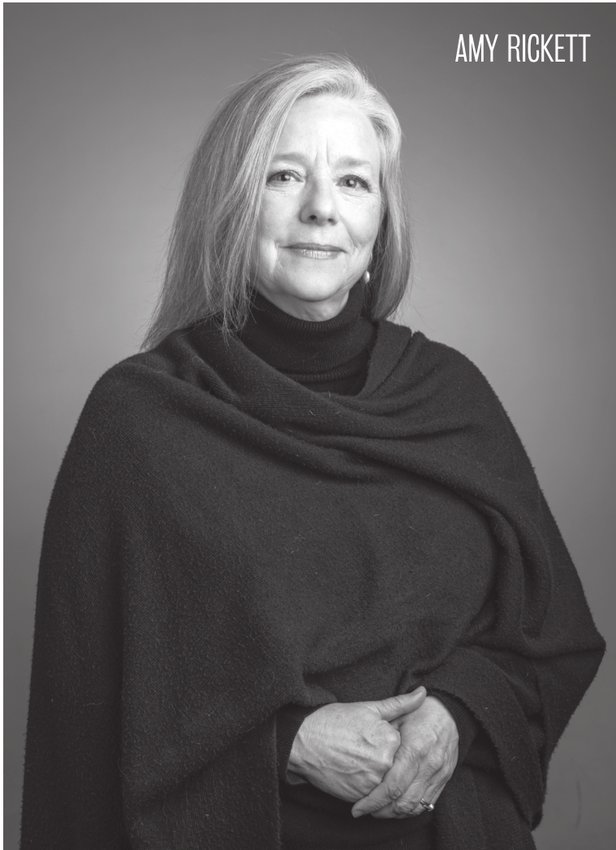
At 55, Amy Rickett has held numerous titles: mother, wife, actor, director.
Despite the positive reviews she receives for her work in community theater, she shies away from the idea she’s recognized and tied to the theater in the popular mind, but she also recognizes she is connected to the art form that has been part of her life since 1992.
— TODD HEYWOOD
Why did you get started in theater?
I love theater. I love to go to theater and be around people in theater. My brother tried to be a professional actor for a time and gave it his all till he was 30. It was just too hard. And so theater has always been in the family in that regard. I went to an open call for Spotlight Theater’s summer season. Anyone who knew Len Kluge knows he was very charismatic in the sense that what he did was different than anything I had ever seen at an audition. Anyway, I didn’t get cast that season. But at the end of that, Len talked about his acting workshop. I had to audition for that workshop, and that was really the beginning. Because then I could work once a week on going with a group of people that were like-minded in approach and learn the craft. And that’s what I did. I learned the craft and I absolutely fell in love with it.
Isn’t it part of the theory at least behind community theaters — having that bonding, that experience of conversation about the art that you’re putting together as a team?
Everybody does theater for different reasons. I can only really speak about why I do it. I do it because for me it is a creative outlet and an expression and I love the work, although it’s really hard. To dive into a script and figure out what the play wright’s intention is, how do you fit that and serve that correctly or in a way that makes sense? Yes, absolutely the magic, absolutely the magic. Art is created in so many different ways.
You’ve begun to focus on directing over acting. What’s that about?
I love to string actors and creative people together, and that’s everybody, even from a technical standpoint, which is not my forte. So when I do get people who are technically proficient and creative and can contribute to the project in a way that I haven’t thought of, then that is fantastic. And then I get to see the whole thing. I get to really direct it, I get to move it and mold it and have conversations, and I love the rehearsal because I get to talk to actors about choices and moments and how do we put that together? And it’s challenging and I just love it.
I love, love, love it.
Isn’t directing much like recreating that workshop experience you talked about with Len and Spotlight Theatre?
Absolutely. The last show I directed, “Superior Doughnuts” at Riverwalk was as close to a workshop experience as I’ve had. Moment to moment work, and I just sat there and was so proud of that piece, really. And it was great, I didn’t want it to end.
Do you think theater is a dying art form?
The arts as a whole are at risk. Only because they depend on grants and money, patrons’ money, patrons coming to see shows. Certainly the younger generation loves musicals, and that’s entirely the focus in a lot of the high school programs. In high school, there needs to be the same amount of focus given to a straight dramatic piece. But in order to sustain dramatic work, or even comedy, kids have to be exposed to it, and they aren’t. They’re exposed to musical theater.
What would your message be to readers?
People need to be curious and explore all aspects of the fine arts. Theater is an important medium, it always teaches us about the human condition. It always helps us be more empathetic. We’re becoming too detached through our technology where we don’t have to talk to each other on the phone, we text, we don’t have to write a letter anymore, we email. It’s just we have to connect as human beings, we’re losing that connection. Theater can sometimes bridge that gap.
PRESERVATIONIST
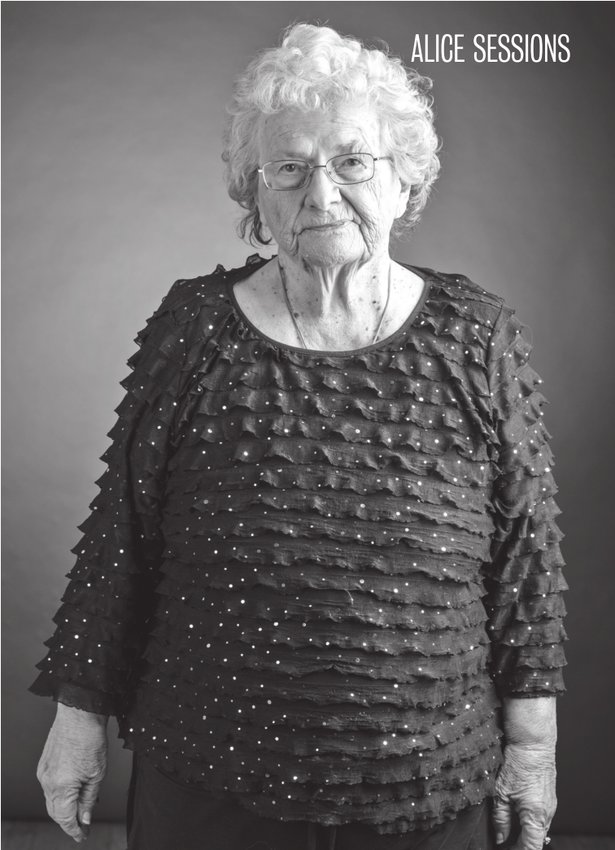
Alice Sessions, 92, has fended off drooling developers for decades to keep a beautiful red house built in 1876 at 402 S. Walnut St. from falling to the bulldozers. The house is a small miracle of survival, alone in a sea of downtown office complexes and parking lots. Last year, Sessions spent $30,000 to fix up the house and received a Preservation Lansing award for keeping it alive.
—LAWRENCE COSENTINO
How long have you lived at 402 S.
Walnut?
I’ve been in and out of that house all my life. My mother lived there when she was 15. I came all the time and slept in the basement. I went over to Arbaugh’s Department Store to roller skate. My grandparents bought it in 1912 and turned it into a boarding house.
The house has a lot of history, doesn’t it?
Oh, yes. The stonemasons who worked on the state Capitol built it and were the first people who lived there — the Glaister brothers. Two of them died from silicated lungs. No mask. Richard Glaister, the father, was so distraught over it he committed suicide. Right in my kitchen. Mayor Ralph Crego lived in Apt. 3 when he was a newlywed.
Where did you grow up?
My family lived out in the DeWitt area. I was a member of the first graduating class at the new high school, Sexton in 1943. I went to work for a year at Sprowl Bros. — they had very expensive clothing. I started MSU with a sister, studying social science. We shared a car to get to MSU together. They hadn’t built all these dorms yet but people were pouring in with the G.I. Bill. Odd things would go on, building a dorm. You’d wake up every morning because they started hammering at 7 a.m. We had to go back home for a while because there wasn’t enough housing.
How did you meet your husband, Homer?
It’s so strange. I married a blind date.
The guy that got the blind date for me — my husband said, “Not many people would have taken anything that guy found.” He was back from World War II in the Philippines. He did well on the GI Bill. We met about when he was graduating. Very good with numbers, very honest, very needed. We were married 61 years before he died. Probably sex every night. I thought that was a great occupation, fun time. We had four kids, let the babies come whenever.
How did you end up at 402 S. Walnut? When the grandparents died, the kids inherited it.
My mother also had a cottage at Lake Lansing that my father had built for a former girlfriend. When the girlfriend found out my father was planning to take care of his mother, and they would all live together, she dumped him! My mother was glad to get him!
Anyway, the taxes on 402 S. Walnut were not paid for six years, and it went up for auction. My mother and father bid for it and they took over in 1966.
Have you ever been tempted to sell?
When we found out the Radisson Hotel was interested in it — my husband thought, ‘Oh boy.’ This was in the 1970s. The other houses — there were five junkers on that corner. Their water pipes froze, they were empty and it was easy to see that they would be demolished.
But no, when the Radisson came, it moved into the place downtown that it’s in now. We bought the house, and the others, the neighbors, have all been torn down. I told the first inspector, “We’re going to retire there.” He said, “What? That house?” He thought it was unbelievable.
What’s special about that house for you?
We moved a lot because of my husband’s job. I counted it recently — I’ve had 40 addresses following my man. We were in Fenton, Alma, Saginaw, Litchfield, we lived in Denver. I’m so glad to be living here — probably because of the 40 addresses elsewhere. Finally, home!
What’s your setup like?
I’ve got Apartment 1. I’m living high on the hog. It’s the first time I’ve ever gotten an apartment so big. My view is the Capitol dome and the Boji Tower. That’s my bay window at night. There is one tree in the way. I haven’t asked them to cut it down yet.
Who planted the irises that fill your front yard? There are so many you can touch them from your car window as you go by on Walnut Street in the spring. I always hope for a red light at Kalamazoo Street so I can be with them a bit longer.
I put them in years ago. They just come up every spring. I got a Roto-tiller, and it was kind of risky because of the utilities underneath the turf. It happened to my son, out in Nebraska. He jumped on the spade and he did get electricity. I haven’t, though.
VOCALIST AND EVENTS COORDINATOR
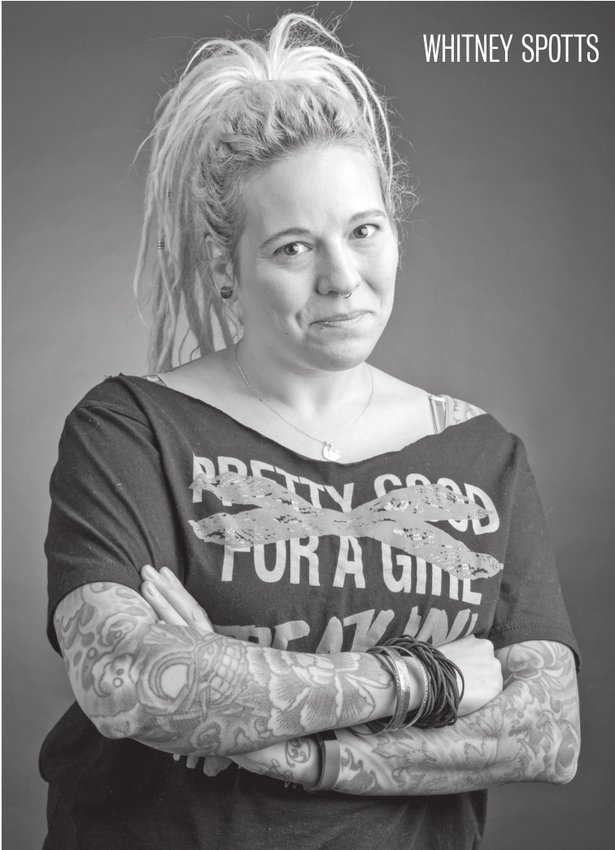
Back in her college days, Whitney Spotts promised herself she’d never fall into a typical career or office job. Today, it’s obvious the Lansing native succeeded. Some know her as the animated, tutu-donning vocalist of Starfarm, a popular local ’80s cover band. Prior to that, she took years of classical voice lessons and fronted the hardrock band Bit. In 2017, she became a professional photographer. Area bookworms might recognize Spotts, 40, as Schuler’s Books & Music author-events coordinator, often seen cruising across the store with her signature blonde dreadlocks and myriad of tattoos and piercings.
— RICH TUPICA
You’ve been in Starfarm for 10 years now. How has the scene changed in that time?
We used to play in East Lansing, and we don’t anymore. It’s all DJs. It’s a strange time to be in a band. The only thing I can say for what we do is that it’s really fun. Obviously, moms are our bread and butter. Forty to 50-year old women adore us. But I’ve noticed we have an older crowd at the beginning of the night and a younger crowd at the end.
Does Starfarm have a mission when it hits the stage?
Our goal is to keep people dancing the whole time. It’s funny, the ’80s were a miserable time. We had trickle-down economics, we had the Cold War. We had all that, so a lot of that ’80s music, like “99 Luftballoons” and Prince’s “1999,” were about: “The world is a scary place, so let’s just have fun tonight.” I think we’re at that place again, culturally and politically. It sounds cheesy, but I feel it’s my job to bring people some joy and escapism on the weekend. It provides it for me, as well. Every year I think it’ll be the year audiences get bored, but it keeps getting better. Every time we play the Green Door, it’s crazier.
Career-wise, you wear a couple of hats. What was your initial job path after graduating from Waverly High School?
I went to Michigan State University. I changed my major so many times, but I eventually dropped everything and went with English Lit. I graduated in 2000, but the final year was a study abroad I did at King’s College in London. It was supposed to be a three-month thing, but I stayed there for two years and did my master’s at Goldsmiths, University of London.
After 15 years at Schuler’s Books, what author events stick out the most?
It’s always David Sedaris. I’ve worked with him four or five times. He is literally the nicest author I’ve ever worked with, but I somehow manage to always embarrass myself in front of him. The first time we hosted him at Eastwood we had 450 people there, so we put his voice on the overhead. Then he started telling a blowjob joke. Parents were leading children out of the store with their hands over their ears. I was like, “Oh, my God! It’s too late to stop.” Now we know, if he comes to the store, keep it centralized.
You said you were 17 when you got your first tattoo. Have they ever caused you problems in the job market?
When I was in London, I stumbled upon this shop. I went in and told him, “I want this dragon that’s a mixture between Chinese traditional and tribal.” I wanted it on my forearm. He said, “That’s a really big tattoo in a very visible spot. Why do you want it there?” I said, “This is my, ‘I will never have a normal 9-to-5 job’ tattoo.”
What kept you coming back for more ink?
Sometimes, as it happens, you date a tattoo artist and you get covered everywhere. We broke up halfway through the second arm. Part of it is, I just love art. My entire life is about art, so it made sense to have my body be art, as well. I think subconsciously, I have used them as a shield. I am a very tender-hearted person, but people look at the tattoos and don’t fuck with me. It might make me look tougher, but all it truly means is I have a high pain tolerance and could probably take a good ass kicking.
Are you able to pick one favorite tattoo?
My favorite is my full back. It’s a tiger. It was the most painful thing I’ve ever done.
I have multiple autoimmune disorders and one of them is fibromyalgia, a chronic pain condition. It primarily lives in my back, so I get a lot of back spasms and pain. The tiger was the reclaiming of my back. It was pain I chose to endure. The tiger is meant to represent never stopping the fight and being strong even when it hurts. I’m not always that person, but it’s who I want to be.
RECORD PRODUCER AND EDUCATOR
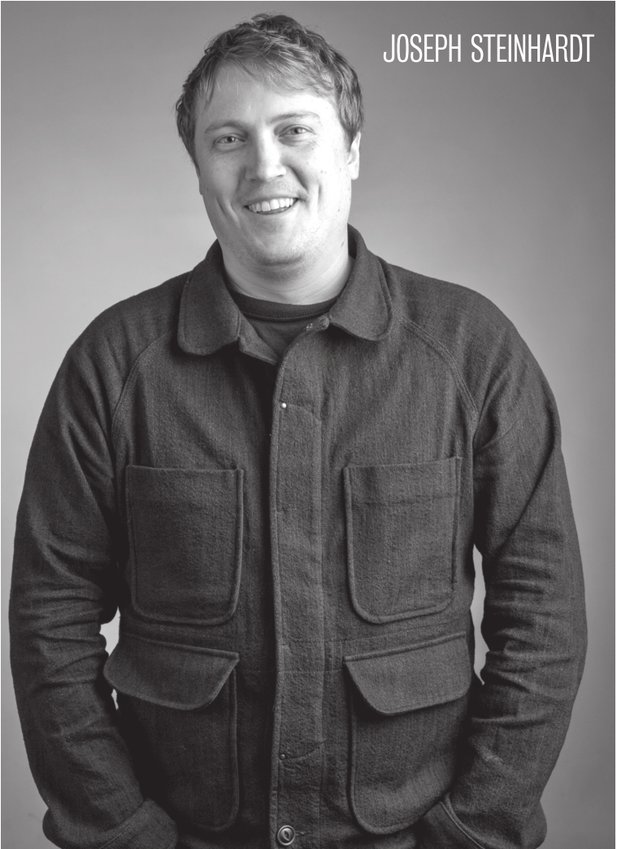
Joseph Steinhardt, 33, doesn’t lead a double life. He just leads one that’s extremely busy. Steinhardt immersed himself in the world of independent music and academia, founding Don Giovanni Records in 2003 and earning his Ph.D. from Cornell University in 2015. Now an assistant professor and researcher at Michigan State University, Steinhardt still makes the time to manage Don Giovanni. He’s moving its headquarters to Lansing later this year.
— SKYLER ASHLEY
How did you move from playing and releasing music in New Jersey to obtaining a Ph.D. from Cornell University?
In some ways it wasn’t a direct path. I never really stopped being involved with underground music in New Jersey. When I went to college, I stayed involved, but I never really saw it as something I wanted to do for a living. I kept pursuing what I wanted to do at the time, which was filmmaking and documentary filmmaking.
Eventually, I didn’t want to work in film anymore, which led to the realization that I wanted to do research. That was a good five- or six-year journey. But, the whole time I was doing that, I was still running Don Giovanni. The label grew and grew, especially while I was in grad school. The label became something that felt much less like a hobby and more like a substantial full-time business or career. So, right now, I kind of do both.
You started Don Giovanni to put out your own band’s album. How did it grow from there? Will the label move with you to Lansing?
It made sense for me to release my own music. Then, through doing that and playing in this music scene, I started having these friends that were also looking for someone to help them. They said, “Well, if you got yours out, you want help get ours out?” The goal of the label was to kind of document this music scene that was happening in New Jersey. As ways to share music on the Internet came out, the goal was no longer documenting this one scene of bands and this community of bands, but trying to get them out there in the public record.Now that I have this full-time job, it makes sense to move the label here. Hopefully we’ll start to focus a little bit regionally, the same way I was focusing regionally in New Jersey.
Your label releases a lot of work from members of marginalized groups. Is that important to you?
I think it’s people’s duty to think about how the work they do affects culture and society, which, for an independent record label, means being thoughtful about what artists you are and are not working with. So it’s not something I consciously think about in the sense of a quota, but its something that happens very naturally when you start being thoughtful about who you are working with in independent communities and when you’re attracted to people that are doing new and interesting things.
Can you tell us about your research for MSU?
I do risk and health communication research. My area looks at decision making about health and risk. I’ve done some work with tobacco. Right now I do a lot of work with road safety. What I specifically look at is the role that narratives play in helping people make better judgment decisions about safety, risk, health, et cetera.
How do you balance your work at MSU with your work at the label? Is that a challenge?
It’s a huge challenge, not to mention, of course, I have a family, so trying to balance three sort of full-time operations, family, being a tenure track professor, and owning the label is very challenging. I don’t get a lot of sleep. I’ve been honestly working to harmonize the music world and the academic world for me a little bit. For now, I’m creating some new classes at Michigan State and starting new research projects related to independent music.
Have you found one side of your life more rewarding between your academic work and your work in the music industry?
I find them both incredibly rewarding so there’s not an easy answer. Which is one of the reasons it hasn’t just been, like, “Ok, I’m going to stop one and do the other.”
Do you ever see yourself picking one over the other?
I mean, I don’t know. I hope I don’t have to, but I might have to at some point.
NEIGHBORHOOD ACTIVIST
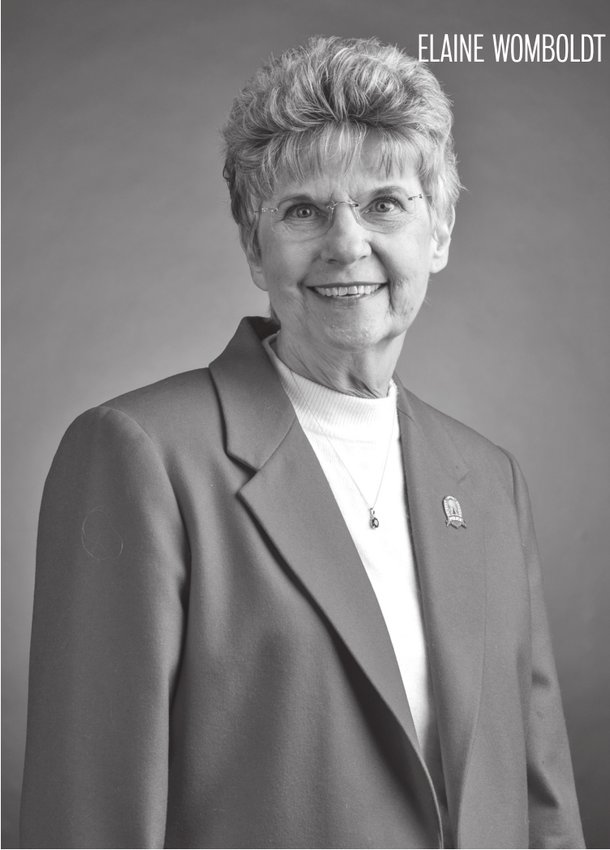
At 69, Elaine Womboldt has become a regular face at Lansing City Council meetings. She’s been rallying neighbors on the city’s south side for several years as the facilitator of Rejuvenating South Lansing, but this is only the latest phase in her long-running push for reforms in the area.
— TODD HEYWOOD
You’ve held numerous office jobs.
Why did you shift to doing advocacy work for children with disabilities?
Both of our kids were discovered to have learning disabilities. I decided that I wanted to help other parents become better advocates for their children. I didn’t want the kids to feel like there was anything wrong with them just because they learn differently. I wanted them and the parents to understand that every child had a unique style of learning, but they all had very strong abilities and that the learning difference was only a part of them, but not them — no different than people having to wear glasses.
What happened when your children were diagnosed?
Our daughter was in kindergarten in a gifted program. By second grade I was saying, “Something’s not right. She’s not getting these letters right, she’s having trouble writing.” And I was just given a lot of different excuses. So we took her to Michigan State University in the Learning Clinic and had her evaluated. And she had a very high IQ, but she had four different learning differences. The school system did not want to identify them. We ended up having to go through the school district and filing many complaints because she was two years academically delayed. We went through a two-week due process hearing. That was a unique experience, because at the time, she was getting private tutoring twice a week. We were helping her, she was getting therapy to help her self-esteem and going to school. And I was working in the school, and people who work there wouldn’t talk to me. I was shunned. So for a while, I was the president of a national learning disabilities group, and that wasn’t really doing it for the family. So I said, “OK, I’m going to start one.” The commander at the Navy Marine Corps on West Saginaw had me come in and I talked to him, and he really liked the idea of helping kids. He gave me office space.
There’s a word I keep hearing from you, and that’s advocating. How did that come about for you?
Well, I’m a farm girl, and we would have a lot of migrant farm workers that would live on the farm. And I went to a country school, and some of those students were in our school, and they were treated differently at times. And I knew that wasn’t right. So I just talked to them and fought for them, and just tried to help them understand that we’re all people and we all deserve the same rights.
Talk about starting Rejuvenating South Lansing.
When we started that, I told my husband I didn’t know if we’d have more than one meeting. But that just keeps growing and growing, and most of that’s because people want their voices heard.
You’ve mentioned several times the disconnection in community. What do you mean?
In our neighborhood, I was a stay-at home mom, and other women were, too.
But we watched out for all the kids, and we yelled at them all. I mean, it didn’t matter whose mom you were. And that’s not happening that much anymore. It isn’t that people are picking on your kids, it’s that they’re watching out for your kids and taking care of them. I think that some of the technology now is good, but my husband and I went out to eat a couple months ago, and this man and woman came in and they sat down. They both got their phones out, and they were on their phones. You can survive without living on the phone. Especially if you’re there to have some type of communication. And I hear different moms talking about their Facebook and this and that, and I wonder, how many hours a night they’re spending on that instead of interacting with their kids? And are their kids plugged into something different?
Support City Pulse - Donate Today!
Comments
No comments on this item Please log in to comment by clicking here